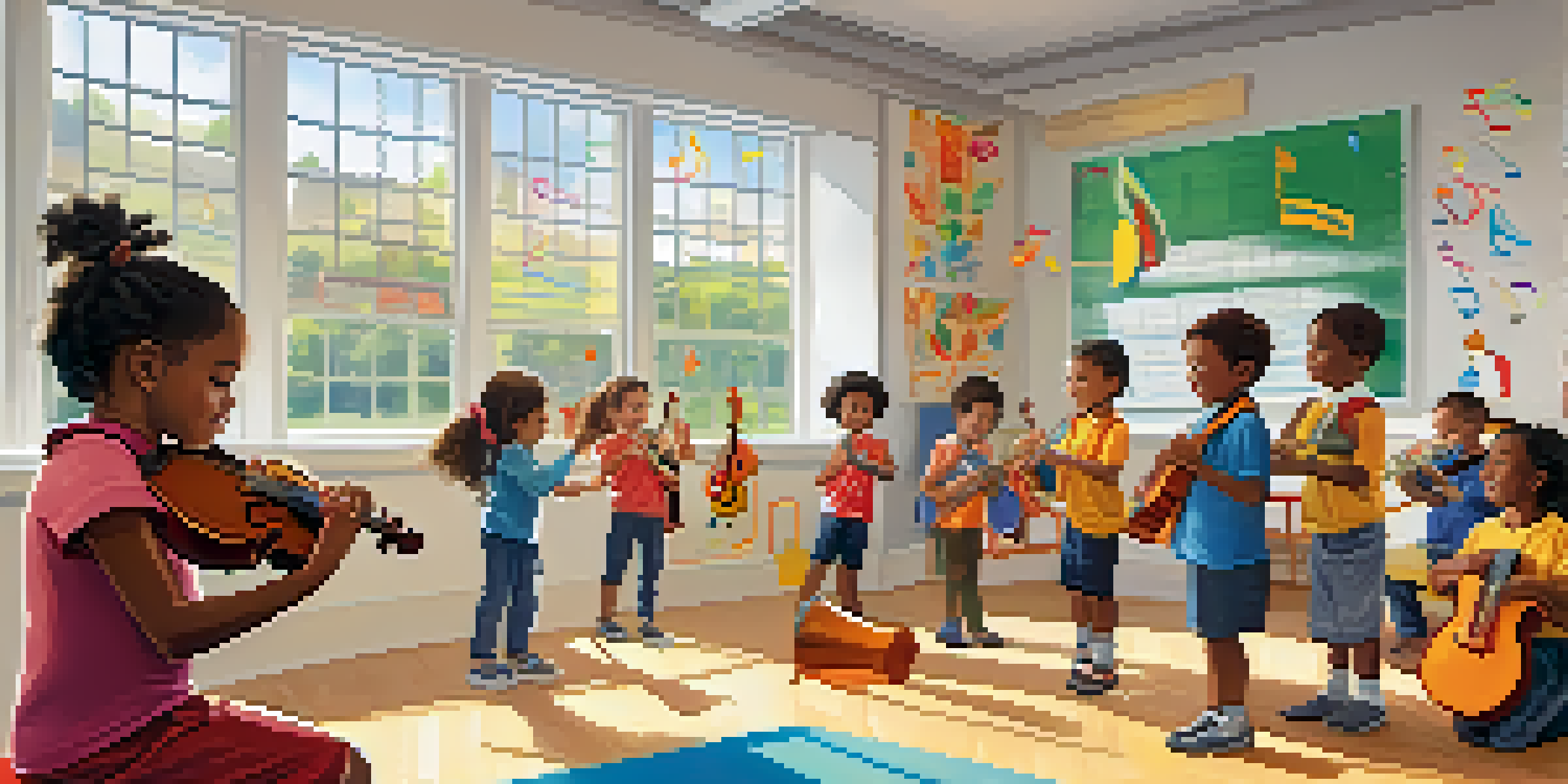Music's Role in Enhancing Memory and Learning in Children

Understanding the Connection Between Music and Memory
Music and memory are intricately linked, with research suggesting that engaging with music can significantly enhance memory retention. When children listen to familiar tunes, their brains respond positively, creating a sense of familiarity that aids in recall. This connection can be likened to how a favorite smell can evoke vivid memories from the past.
Music can change the world because it can change people.
Studies have shown that music stimulates various areas of the brain, particularly those involved in memory formation. For instance, playing an instrument requires coordination and concentration, which in turn strengthens cognitive abilities. Just as athletes train their bodies, children can train their minds through musical engagement.
Moreover, the rhythmic patterns in music help children organize and structure information more effectively. This structure can be especially beneficial when they are learning new concepts, making it easier for them to assimilate and retrieve information when needed.
How Music Affects Learning Styles in Children
Every child has a unique learning style, and music can cater to a variety of them. For auditory learners, music provides a rich auditory backdrop that enhances focus and retention. Meanwhile, kinesthetic learners can benefit from incorporating movement into their musical activities, such as dancing or clapping along.

Visual learners also gain advantages from music through the use of colorful notes and engaging music videos. This multi-sensory approach not only keeps children engaged but reinforces their understanding of concepts through different channels. For instance, a child may remember a math formula better if it’s set to a catchy tune.
Music Enhances Memory Retention
Engaging with music significantly boosts memory retention in children by creating familiar patterns that aid recall.
By integrating music into the learning process, educators can create a more inclusive environment that addresses the diverse needs of students. This approach not only boosts engagement but also fosters a love for learning that can last a lifetime.
The Benefits of Music in Early Childhood Education
Incorporating music into early childhood education has profound benefits for memory and learning. Children exposed to music are often more adept at language development, as melodies and rhythms enhance phonemic awareness. This is particularly important when learning to read, as recognizing sounds is a foundational skill.
The only thing better than singing is more singing.
Additionally, music encourages social interaction among young learners, promoting teamwork and communication skills. Group activities like singing or playing instruments together foster a sense of community, allowing children to learn from one another while developing critical social skills.
Furthermore, music can be a powerful tool for emotional expression, helping children articulate their feelings and experiences. This emotional connection to music can create a safe space for learning, making children more receptive to new information.
Music and Memory Techniques for Parents and Educators
Parents and educators can utilize music as a memory technique to enhance learning outcomes. For example, creating songs or rhymes that incorporate vocabulary words or math facts can make studying more enjoyable and effective. Children are often more likely to remember information set to music than traditional study methods.
Another effective technique is using background music while children engage in homework or reading. Studies suggest that soft, instrumental music can create a calming environment that improves concentration and reduces distractions. This approach can be particularly helpful during study sessions, as it can help children focus their thoughts and minimize anxiety.
Supports Diverse Learning Styles
Music caters to various learning styles, helping auditory, kinesthetic, and visual learners engage more effectively with educational content.
Parents can also encourage their children to create their own music-based memory aids. This not only reinforces learning but also allows children to express their creativity, making the process of memorization feel less like a chore and more like a fun activity.
The Role of Rhythm in Learning and Memory Retention
Rhythm plays a critical role in enhancing memory and learning. The repetitive nature of rhythmic patterns can help solidify information in a child's mind, making it easier to recall later. This is akin to how we often remember lyrics to songs after hearing them repeatedly.
Engaging with rhythm can also improve timing and coordination, which are essential skills for other areas of learning. Activities like clapping, drumming, or tapping can develop fine motor skills while simultaneously reinforcing cognitive functions. Children may not even realize they’re learning while they’re having fun!
By incorporating rhythm into educational activities, teachers can create a dynamic learning environment that captivates students. This approach not only makes learning enjoyable but also promotes long-term retention of information.
Music as a Tool for Emotional and Cognitive Development
Music serves as a powerful tool for emotional development, enabling children to explore their feelings and understand complex emotions. Through music, children can express themselves in ways they might struggle to articulate verbally. This emotional exploration can lead to enhanced cognitive development as children learn to connect feelings with thoughts.
Research indicates that children who engage with music regularly exhibit improved emotional regulation. This ability to manage emotions is crucial for learning, as it helps children stay focused and motivated. Just like a well-tuned instrument, children need to find harmony within themselves to achieve their best.
Fosters Emotional and Cognitive Growth
Music not only aids in emotional expression but also enhances cognitive development, promoting resilience and emotional regulation in children.
Additionally, music can foster resilience and a positive mindset, equipping children with the skills to overcome challenges. When they encounter difficulties in learning, a musical background can provide them with the confidence and emotional support needed to persevere.
Final Thoughts on Music, Memory, and Learning
The relationship between music, memory, and learning in children is both fascinating and powerful. By integrating music into daily learning practices, parents and educators can help children unlock their full potential. Just as a garden flourishes with care and attention, so too do children's minds thrive when nurtured through music.
As research continues to unveil the benefits of music in education, it's clear that this art form is not just for entertainment but a vital part of cognitive development. Encouraging children to explore music can open doors to new learning opportunities and foster a lifelong appreciation for creativity.

In conclusion, embracing music as a learning tool not only enhances memory but also cultivates a rich, engaging environment where children can thrive academically and emotionally. So, let the music play and watch as children dance their way to success!